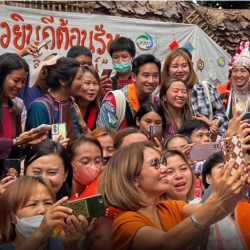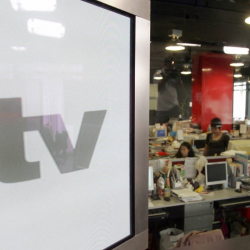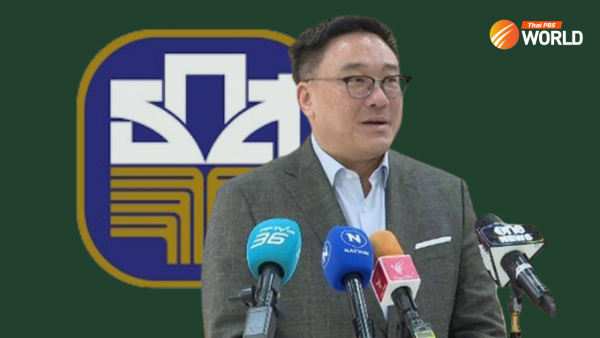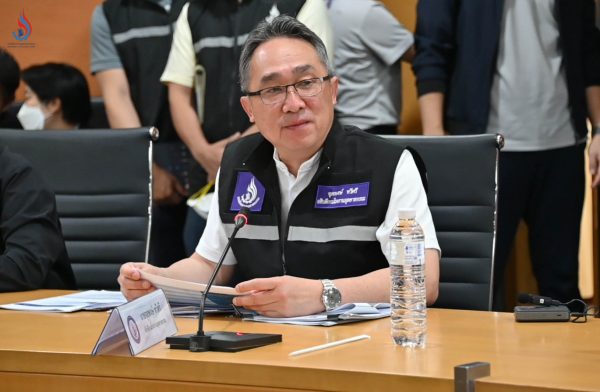iTV: Born of Bloody May, trouble under Thaksin, and now Pita’s nemesis?
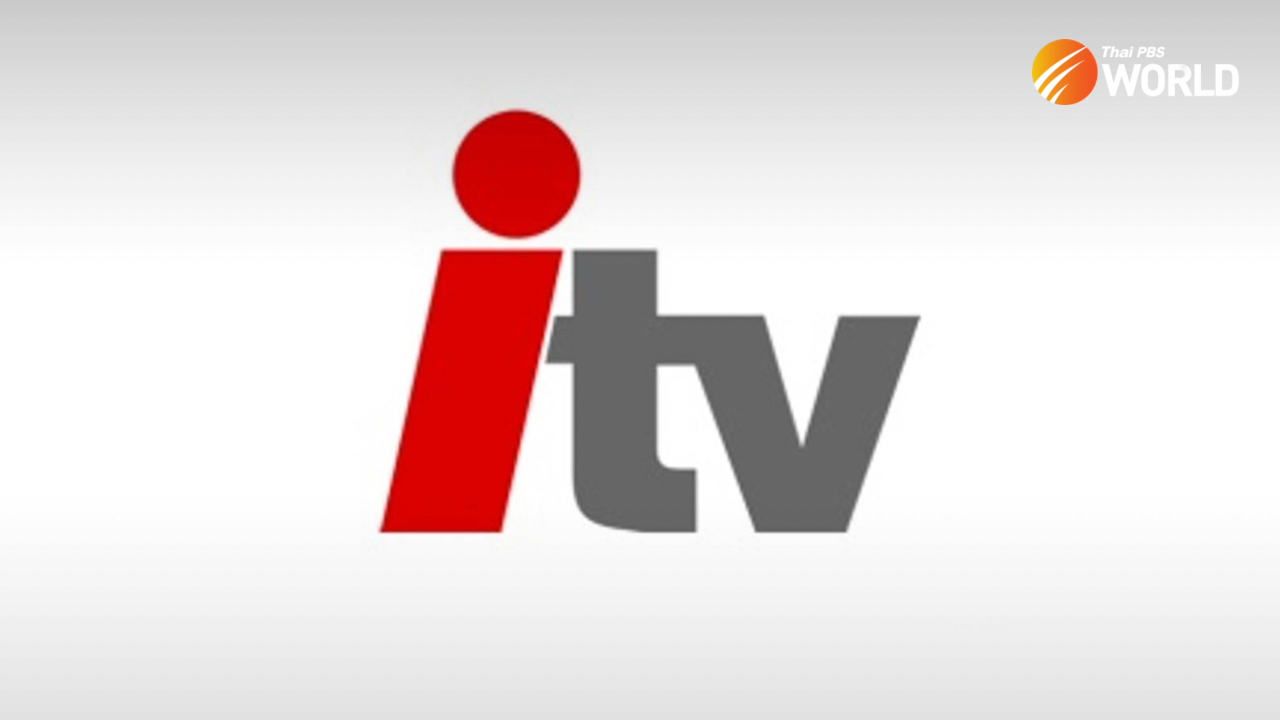
Though it went off air 15 years ago, Thailand’s first independent broadcaster iTV is back in the spotlight with a central role in the saga that could decide whether or not Move Forward Party leader Pita Limjaroenrat becomes the next prime minister.
In 2008, Pita inherited 42,000 shares in iTV Plc following his father’s death in 2006. Earlier this month, Pita disclosed that he had recently allocated the iTV shares to other heirs of the estate.
His accuser, Ruangkrai Leekitwattana, said records show that the embattled PM candidate transferred all his iTV shares to his younger brother on May 25.
Pita’s iTV shareholding has become a major obstacle in his path to the premiership despite his party’s stunning victory in the May 14 general election. Move Forward won 151 of the 500 MP seats up for grabs, beating pre-election favorite Pheu Thai into second place with 141.
However, the Election Commission (EC) is now investigating whether Pita contested the poll despite knowing he was not qualified to do so because of his stake in iTV. The agency rejected three petitions filed by Ruangkrai, who asked it to investigate if Pita’s shareholding violated the Constitution’s rule that bars anyone from contesting for an MP seat if they are “the owner of or shareholder in any newspaper or mass media business”.
Born out of Bloody May
The idea of setting up an independent TV station in Thailand was born after the crackdown on pro-democracy protesters in May 1992, which became known as “Bloody May”. Over 50 people were killed and about 700 injured, according to official records, after security forces opened fire on demonstrators protesting the government of General Suchinda Kraprayoon, who resigned in disgrace shortly afterwards.
News of the crackdown had been censored by Thailand’s existing TV channels, most of which were either run by the military or considered government mouthpieces. The Thai general public had to rely on foreign media outlets for news coverage of the violent events in Bangkok.
As a result, the next government, led by Anand Panyarachun, came up with the idea of launching an independent television station to offer the public access to balanced reporting.
ITV was launched on July 1, 1996, after its holding company Siam Infotainment Co Ltd was granted a 30-year concession to operate a free-to-air television station in exchange for a 25.2-billion-baht fee. The firm’s major shareholders included Siam Commercial Bank (SCB) and Nation Multimedia Group.
The new TV station’s main focus was news and current affairs, with no more than 30% of airtime devoted to entertainment content.
After the baht was devalued during the 1997 Asian financial crisis, hitting companies that held dollar loans, Siam Infotainment suffered severe losses. SCB, as a major shareholder and main creditor, pushed for a revision of the concession terms – particularly regarding the limit on the number of shareholders – and sought to have iTV shares listed on the Stock Exchange of Thailand.
Thaksin steps into spotlight
In February 2000, the Chuan Leekpai government approved the request to revise iTV’s concession terms. In November of that year, SCB brought in Shin Corporation, which was owned by Thaksin Shinawatra’s family. The tycoon-turned-politician would become Thailand’s prime minister just a few months later in February 2001.
Shin Corp purchased 39% of the holding company for about 1.6 billion baht and earned the right to manage iTV, while SCB retained its 55% shareholding. However, Shin Corp later upped its stake to become the majority shareholder.
The Shinawatras’ takeover of iTV was met with strong opposition from the TV station’s editorial team, led by managing editor Jira Hongsamrerng.
The station’s new management, appointed by Shin Corp, was accused of interfering with editorial content during the run-up to the general election in January 2001.
‘Editorial interference at crucial period’
ITV reporters complained that their work was being interfered with. They claimed news and analysis critical of Thaksin and his Thai Rak Thai Party was being censored or removed from the air altogether.
The editorial team issued a seven-point statement calling on the new executives to halt the censorship, pointing out that it violated the constitution.
Shortly before the 2001 election, iTV reporters led by Jira issued another statement, calling on Thai Rak Thai leader and PM-hopeful Thaksin to help end the meddling and uphold the public broadcaster’s credibility. The editor resigned shortly afterwards.
A month later, iTV staff members set up their own labor union, which convened its first meeting on February 6, 2001, to select board members. The following day, the station’s management dismissed 23 members of the iTV editorial team – 15 of whom were executives of the new labor union. The management claimed they had been laid off due to continual business losses.
Most of the dismissed employees – called “the iTV rebels” by the media – sued the management for wrongful dismissal at the Central Labour Court in September 2002. After a legal battle lasting almost three years, the Supreme Court in March 2005 ordered iTV to rehire the plaintiffs and pay them compensation for lost earnings.
Long legal battle
In March 2002, Shin Corp listed iTV on the Stock Exchange of Thailand, before increasing its registered capital to 7.8 billion baht the following year.
Two years later, iTV fell into a legal dispute with the PM Secretariat Office after the station changed its programming ratio of news to entertainment from 70:30 to 50:50 and reduced its annual concession fee payment from 1 billion baht to 230 million, following the green light from an arbitration tribunal.
The Supreme Administrative Court in 2006 ruled in favor of the PM Secretariat Office, which demanded 97.7 billion baht in compensation for contract infringements over programming content, in addition to 2.2 billion baht in unpaid concession fees.
In February 2007, following iTV’s refusal to pay, the post-coup government led by General Surayud Chulanont decided to revoke its concession. The broadcaster was taken off the air on March 7 that year.
The station was later renamed Thailand Independent Television, or TITV, and managed by a new executive board consisting mainly of bureaucrats. In January 2008, TITV was transformed into the Thai Public Broadcasting Service (Thai PBS) under the Public Broadcasting Act.
ITV Plc also accused the PM Secretariat Office of dishonestly terminating its concession. In January 2016, an arbitration tribunal ruled in its favor, effectively canceling all debts between the two sides.
The PM Secretariat Office responded by asking the Administrative Court to revoke the tribunal’s ruling on grounds that it did not reflect the original contract terms. The court in late 2020 found that the tribunal’s ruling was lawful and there were no grounds to revoke it.
In January 2021, the PM Secretariat Office appealed to the Supreme Administrative Court. The case is still ongoing.
Current major shareholders
In 2006, iTV’s majority shareholder Shin Corporation was acquired by Temasek Holdings, the Singaporean government’s investment arm, for 73 billion baht in a controversial sale that was strongly opposed by Thai media watchdogs and activists.
Shin Corp was renamed InTouch Holdings Plc in March 2014 and currently holds a 52.9% stake in iTV Plc.
InTouch’s largest shareholder currently is Gulf Energy Development Plc, which holds a 46% stake in the company, followed by Singtel Global Investment with a 25% shareholding.
In the latest twist to iTV’s long and tumultuous history, minutes from its April 26 shareholders’ meeting are under intense scrutiny amid allegations they were doctored in a conspiracy to have Pita disqualified from taking office.
The minutes record that Intouch president and iTV CEO Kim Siritaweechai, responding to an iTV shareholder’s question, confirmed that iTV was still active in the media business. However, a video clip of the meeting then emerged revealing that Kim had actually replied that iTV no longer operated in media.
On Thursday, iTV Plc’s board of directors issued a statement in a bid to clarify the situation.
“The company had no intention of stating that it was still operating as a media business,” iTV said, referring to the minutes of the April 26 meeting.
By Thai PBS World’s Political Desk

